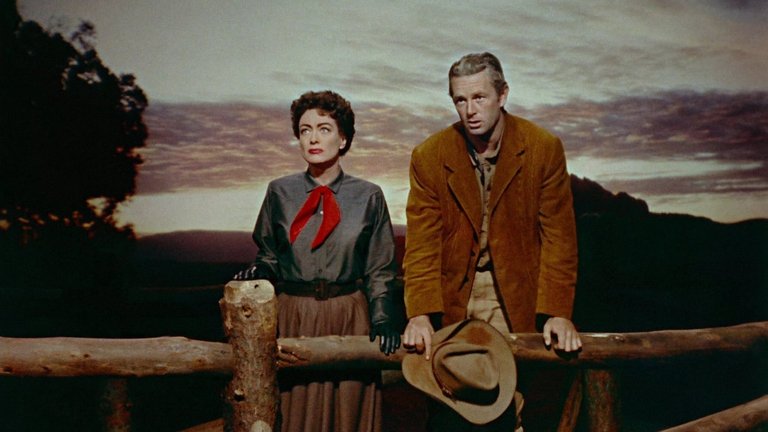Film Review: Johnny Guitar (1954)

Old Hollywood films often carry hidden messages or themes that were indirectly conveyed due to oppressive politics or censorship standards. Johnny Guitar, 1954 western directed by Nicholas Ray, is frequently cited as a prime example of this phenomenon, where underlying meanings and social commentary were subtly woven into the narrative.
Based on the eponymous novel by Roy Chanslor, the plot follows the story of Vienna (played by Joan Crawford), a strong-willed saloon owner, who becomes embroiled in a web of suspicion and violence in an Arizona cattle town. Due to her chequered past and saloon being frequented by shady characters like her part-time boyfriend Dancing Kid (played by Scott Brady), Vienna is frowned upon by “decent” citizens like John McIvers (played by Ward Bond). She is at the same time hated by Emma Small (played by Mercedes McCambridge), woman who acts like cattle baron and wants to get rid of Vienna in any way possible. Vienna, on the other hand, defies intimidation knowing that the arrival of railroad to town would make her saloon extremely profitable. As tensions slowly escalate after the stage coach robbery attributed to Dancing Kid, and indirectly, to Vienna, the arrival of Guitar (played by Sterling Hayden), the mysterious drifter who might had connections with Vienna in the past, might make them reach tipping point.
Produced by Republic Pictures, the most prestigious minor Hollywood studio of its time, Johnny Guitar benefited from a modest budget that granted director Nicholas Ray greater creative freedom. This freedom allowed for the film to deviate from traditional Western conventions. Because of that, Johnny Guitar is often hailed as one of the most unusual Westerns of the 1950s Hollywood era, primarily due to its departure from typical Western archetypes and its focus on complex character dynamics. A standout feature of the film is the main dramatic conflict not unfolding between men but between two women - Joan Crawford's Vienna and Mercedes McCambridge's Emma, with its intensity suggesting deeper layers of obsession and unresolved tension, leading to interpretations of complex relationships and hidden meanings which, especially in later decades, involved unrequited lesbian love. Vienna and Emma not only dominate men, but dress like men (in case of Vienna) and act like men, with their conflict being ultimately resolved in a unmistakeably masculine gunfight.
Beneath its Western façade, "Johnny Guitar" subtly critiques the political climate of 1950s America, particularly the anti-Communist witch-hunt that affected Hollywood, leading to purges and blacklisting, including scriptwriter Ben Maddow, whose work would be ultimately “fronted” by Philip Yordan. The film's themes of paranoia and “good” citizens succumbing to persecuting or even lynching of “undesirables” can be easily seen as the mirror of what went in America. For Sterling Hayden, actor who had been forced to point fingers at his colleagues in order to preserve his career, role in such implictly anti-McCarthyst film was seen as some sort of personal redemption.
Maddow’s script, while good in creating unusual characters and strong drama, is less successful in working as actual western. Settings and action are relatively limited, some scenes are overlong, certain subplots (like stage coach robbery) are unresolved. On the other hand Nicholas Ray's competent direction, coupled with a vibrant use of colour and a haunting soundtrack by Vic Young, coupled by catchy and haunting ballad by Peggy Lee, elevates the film beyond its genre constraints.
The acting is very good, with standout performance by Joan Crawford who, apparently at ease with her advanced age, plays middle-aged heroine who manipulates more with intimidation than allure. Mercedes McCambridge also delivers memorable performances. Two actresses, like characters they had played, utterly disliked each other at set, with Ray putting their off screen hostility to good use in front of cameras. Their work is complemented by Sterling Hayden who confidently plays second fiddle, as well as small army of capable character actors like Ward Moore, John Carradine, joined by Ernest Borgnine in one of his early roles.
While initially misunderstood in the USA for its departure from traditional Western tropes, Johnny Guitar found acclaim among European critics as an "art film," embraced by Truffaut and other future leaders of French new Wave for its bold creativity and thematic depth. Despite its unconventional approach, the film remains a testament to the possibilities of the Western genre when approached with innovation and a willingness to challenge conventions. While it may not resonate with all modern audiences, its legacy as a groundbreaking and thought-provoking film in the Western genre makes it a recommended watch for fans seeking a different perspective on classic Hollywood cinema.
RATING: 7/10 (+++)
Blog in Croatian https://draxblog.com
Blog in English https://draxreview.wordpress.com/
InLeo blog https://inleo.io/@drax.leo
Hiveonboard: https://hiveonboard.com?ref=drax
Rising Star game: https://www.risingstargame.com?referrer=drax
1Inch: https://1inch.exchange/#/r/0x83823d8CCB74F828148258BB4457642124b1328e
BTC donations: 1EWxiMiP6iiG9rger3NuUSd6HByaxQWafG
ETH donations: 0xB305F144323b99e6f8b1d66f5D7DE78B498C32A7
